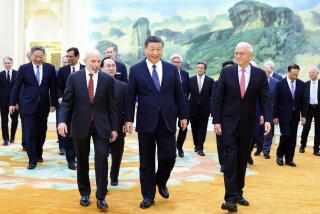House Backs Renewal of China Trade Status
After four hours of often heated, emotional debate, the House on Tuesday rejected attempts to sever normal trade relations with China.
The 259-173 vote against the resolution was seen as one of the most important foreign policy decisions of the Congress. It constituted a major victory for those with stakes in the fast-growing U.S.-China trade relationship and for those convinced that building on that relationship is the best way to influence Beijing’s behavior in areas such as human rights, religious persecution and arms proliferation.
Tuesday’s outcome was also a victory for President Clinton, who personally urged lawmakers in a White House meeting last week not to rescind the decision he announced in late May to renew China’s routine trade privileges, known by the misnomer of most-favored-nation trading status, or MFN.
The United States offers most-favored-nation status to 184 countries and withholds it from only a handful, including Afghanistan, Cuba and Laos.
“We are gratified by the vote,” said U.S. Trade Representative Charlene Barshefsky. “To deny MFN would be to sever the economic relationship [with China], and this would sever the political relationship.”
She said awareness of these stakes, along with pleas from prominent Hong Kong figures that revocation of the trade status would seriously damage the British colony’s economy as it reverts to Chinese control, were key factors in defeating the House resolution.
Martin Lee, the chairman of Hong Kong’s Democratic Party; Anson Chan, the territory’s chief administrator; and Chris Patten, the British governor, all argued that continued normal trade relations are vital to Hong Kong’s future.
Several other factors, however, fed anti-MFN sentiments and turned this year’s debate into one of the most bruising on record.
After a disastrous attempt during his first year in office to link U.S. relations with China to improvements in its human rights policies, Clinton has since struggled to isolate major areas of political conflict, such as human rights and weapons proliferation, from the larger U.S. economic and political relationship with Beijing.
Clinton’s opponents claim that the policy has produced no improvements in key areas and has actually led to a deterioration in Beijing’s respect for human rights. This frustration--coupled with the involvement in the debate of conservative Christian groups for the first time and a Republican backlash stemming from allegations that Beijing tried to influence U.S. elections last year with illegal campaign contributions--helped fuel support to cut off the trading privileges.
*
“Enough is enough,” declared Gerald B. H. Solomon (R-N.Y.), who sponsored the resolution to end normal trade relations. “Extending MFN is the cornerstone of [Clinton’s] policy of appeasement.”
While these factors helped make this year’s vote closer than last year’s 286-141 outcome, many MFN proponents said they were surprised by their margin of victory.
“This is 15 to 20 votes more than close observers believed,” said Robert Hall, vice president and international trade counsel at the National Retail Federation, who lobbied actively on behalf of continued normal trade relations with China. A letter last week from evangelist Billy Graham and an emotional news conference with a group of missionaries active in China helped move “some social conservatives” to vote against severing MFN, he said.
“The president’s meeting also helped,” Hall added.
Although Tuesday’s vote marked the eighth time in eight tries that a strong contingent of MFN opponents in Congress has failed to sever the U.S.-China trade relationship, the intensity of this year’s debate and the gains of opponents virtually ensured another confrontational round next year.
The United States first extended the trade benefits to China in 1980, soon after President Carter established diplomatic relations with Beijing. The status must be renewed each year under a law that applies to all Communist countries.
For a decade, however, China’s trade benefits were renewed routinely. The congressional efforts to strip away China’s trade status began in 1990, the year after the Chinese government used its People’s Liberation Army to quell pro-democracy demonstrations in Beijing’s Tiananmen Square.
For many opponents of normal trade relations with China, the debate has become as important as the outcome.
“I think the past few weeks have shown that the MFN process does have usefulness,” said Mike Jendrzejczyk, Washington director of Human Rights Watch/Asia. “It puts the spotlight on China’s human rights abuses--and also, this year, upon Hong Kong.”
Those remarks underscored an issue the Clinton administration and Congress will probably face over the next year: whether to end the annual debate and give China permanent MFN status.
Administration officials suggested last fall that they would favor making China’s MFN benefits permanent. But they held off from attempting to do so this year amid a series of congressional investigations into campaign contributions from Asian and Asian American sources.
Proponents of extending China’s trade benefits helped their cause this year by crafting a series of alternative measures that they said would still enable members of Congress to register disapproval with Beijing.
More to Read
Get the L.A. Times Politics newsletter
Deeply reported insights into legislation, politics and policy from Sacramento, Washington and beyond. In your inbox three times per week.
You may occasionally receive promotional content from the Los Angeles Times.










